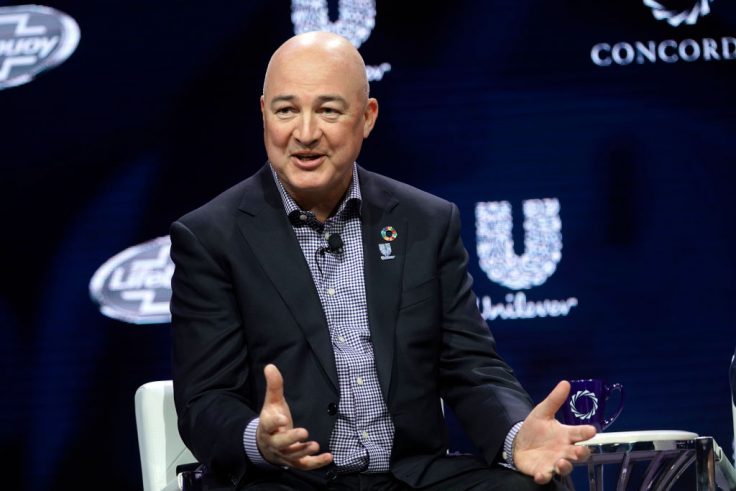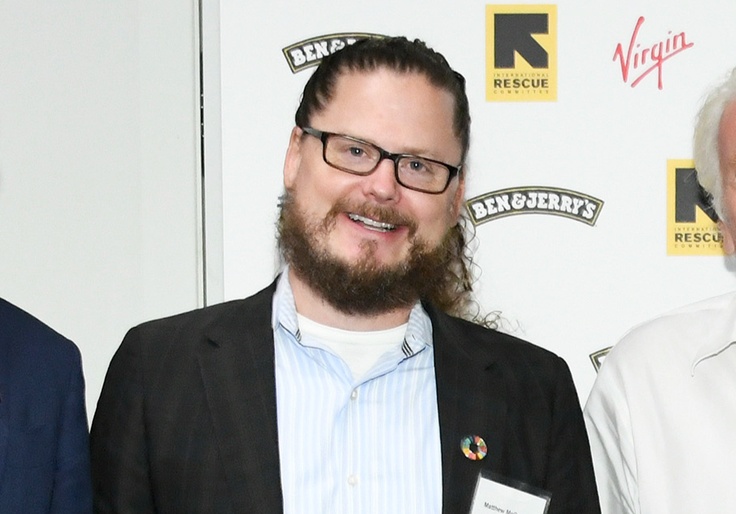Damage Control: Unilever’s ‘Inclusive’ CEO Struggles To Renounce Ben & Jerry’s Anti-Semitism
Alan Jope helmed the conglomerate's operations in China, Russia, Africa, and the Middle East

The CEO of multinational conglomerate Unilever, parent company of Ben & Jerry's, struggled to renounce the ice cream maker's anti-Semitism during a conference call with investors on Thursday.
"Unilever remains fully committed to our business in Israel," CEO Alan Jope said in response to critics of Ben & Jerry's inflammatory decision to stop selling its products in the West Bank and East Jerusalem. "I can assure you it is not our intent to regularly visit matters of this, where sensitivity has been a long-standing issue for Ben & Jerry's."
Sensitivity indeed. Earlier this week, the firm that became an international success selling whimsical obesity to children proclaimed that operating in the so-called Occupied Palestinian Territory was "inconsistent with our values." Jope repeatedly cited the sentiments of Ben and Jerry's "independent board" as the sole factor in the anti-Semitic decision. He sought to assure investors it was "not our intention that every quarter we'll have [a decision] quite as fiery as this one."
Jope has considerable experience in matters of sensitivity. Before being promoted to CEO in January 2019, he oversaw Unilever's business operations in China, a country whose authoritarian communist regime strongly encourages Western companies and their executives to refrain from criticizing its ruthless authoritarianism, especially when it comes to the genocide of Uyghur Muslims in Xinjiang.
The Unilever boss has also helmed the company's operations in Russia, Africa, and the Middle East, regions that do not exactly comply with the "inclusive" standards Unilever projects to Western audiences.
Last month, for example, the company launched an initiative called "Act 2 Unstereotype" and vowed to "provoke inclusive thinking across the end-to-end marketing process." Its goal is nothing less than to "help influence the next generation of people to be free of prejudice." Except, apparently, when it comes to prejudice against Israeli Jews.
Jope, who once served as a guest judge on The Apprentice with Donald Trump, has written extensively on his business philosophy, which espouses a "multi-stakeholder approach," a "collaborative mindset," "collective reinvention," and other iterations of corporate nonsense.
"Stakeholder capitalism is about radically changing the values of the company, and the way it operates, to reflect the interests of multiple stakeholders all the time," Jope wrote last year in the Telegraph. "It means taking action to address the climate crisis, and also looking at the favelas of Brazil, the townships of Africa and the slums of India to see what business can do to help tackle social and economic inequality."
Ben & Jerry's decision appears at odds with this philosophy, to say the least. As the Washington Free Beacon editors wrote on Tuesday: "We're not clear how exactly removing Ben & Jerry's ice cream from grocery stores in the West Bank will benefit the Palestinians. The move appears to be primarily an act of guerrilla theater and a demonstration of base prejudice."
Israeli prime minister Naftali Bennett had a similar reaction and promised to hold the Unilever CEO accountable for the "clearly anti-Israel step." According to Bennett's office, the prime minister spoke directly with Jope and told him the decision would have "serious consequences, legal and otherwise," as Israel would "act aggressively against all boycott actions directed against its citizens."
Texas Weighs Divestment From Ben & Jerry’s Parent Company Over Israel Boycott
New Jersey, Illinois, and Florida could also divest from British conglomerate

Texas may divest from Ben & Jerry's parent company after the ice cream manufacturer announced it will end operations in Israeli-controlled territories, the state's head financial officer said Thursday.
"I've directed my staff to determine whether any specific action taken by Ben & Jerry's or Unilever would trigger a listing under Chapter 808 of the Texas Government Code," which prohibits the state's pension fund from investing in companies that refuse to operate in an "Israeli-controlled territory," State Comptroller Glenn Hegar told CNBC.
The move follows Ben & Jerry's announcement Monday that the company will no longer sell its products in "Occupied Palestinian Territory," referring to the West Bank and East Jerusalem. The Texas statute applies to parent companies and could force the state to divest its multibillion-dollar retirement fund from Unilever, which purchased the ice cream company in 2000.
Ben & Jerry's boycott could also force a dozen other states with similar laws, including New Jersey, Illinois, and Florida, to divest from the British conglomerate. Florida chief financial officer Jimmy Patronis, who manages his state's pension fund, said his office is evaluating the issue, according to CNBC. More than 30 states have anti-boycott laws and executive orders, including measures that could prohibit state governments from working with Unilever and Ben & Jerry's.
Following the ice cream company's Monday announcement, Unilever said it remains "fully committed to our presence in Israel, where we have invested in our people, brands, and business for several decades." Ben & Jerry's board chair Anuradha Mittal, however, says Unilever released the statement without first consulting the Vermont-based company. Members of the board had objected to the statement, which includes a promise to "stay in Israel through a different arrangement."
In its statement, Ben & Jerry's said that selling products in Israeli-controlled territories was "inconsistent" with its values. Its parent company, however, operates in several countries accused of human rights abuses. Unilever works with a Chinese state-owned company that is based in Xinjiang, where China detains Muslim Uyghurs in concentration camps.
No comments:
Post a Comment